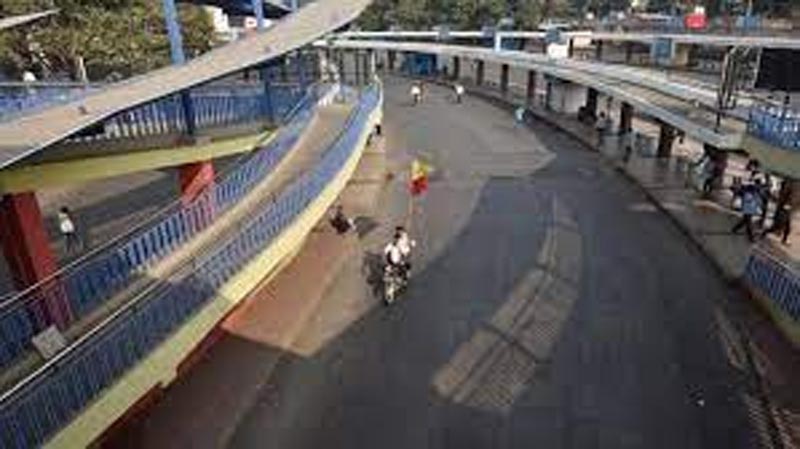CHENNAI, Sep 26 : A dawn-to-dusk Bengaluru bandh called by local outfits over the Cauvery dispute evoked partial response today, even as the protesting groups demanded implementation of the Mekedatu reservoir project, a proposal touted by state deputy Chief Minister D K Shivakumar as a solution for the inter-state river water dispute involving Tamil Nadu.
Amid the protests in the Karnataka capital today and a proposed one on Friday, Tamil Nadu said the Supreme Court verdict is binding, irrespective of such agitations.
Shivakumar also welcomed the Cauvery Water Regulation Committee (CWRC) rejecting Tamil Nadu’s request for 12,000 cusecs of water from the river and recommending his state release 3,000 cusecs to the neighbouring state till October 15.
‘Karnataka Jala Samrakshana Samiti’, an umbrella outfit of farmers’ associations and other organisations led by Kuruburu Shanthakumar, had given the call for today’s dawn to dusk (6am to 6pm) shutdown, and it found the backing of opposition BJP and the JD(S). The protest affected normal life.
Accusing the two opposition parties of politicising the Cauvery row, Karnataka Chief Minister Siddaramaiah rejected allegations his government has failed on the issue, and said his administration has never lagged behind in protecting the interests of the state, its people and farmers.
On Tuesday, Shanthakumar and other leaders of the Samiti were detained by the police at the Mysuru Bank circle, as they were trying to lead a protest march towards Town Hall.
Several activists of pro-Kannada organisations were also whisked away by the police at Town Hall, as they gathered there to stage a protest.
The activists hit out at the government for allegedly using police force to curtail the protests and the bandh.
Farmers and pro-Kannada organisations with their leaders, including Shanthakumar and others, later staged protests at Freedom Park, which is the only designated place for such demonstrations.
Transport Minister Ramalinga Reddy met protesters there and received a memorandum from them and said he will take it to the notice of the chief minister.
The five-point memorandum includes demands that water is not released from Cauvery to Tamil Nadu, an election commission-like body be put together to assess things during distress years and implementation of the Mekedatu balancing reservoir project.
Shanthakumar claimed the bandh was successful. The samiti set a 3-day deadline for the government to announce its decision, failing which it will intensify protests.
City police had taken all adequate security measures to respond to any violent situations that may happen during the protests.
Bengaluru Police Commissioner B Dayananda said prohibitory orders under section 144 will be in place across the city from midnight on Monday to midnight on Tuesday.
There were reports of some miscreants allegedly trying to shut hotels that were open in Jayanagara area and trying to damage property. Police registered a case.
Meanwhile, ‘Kannada Okkuta’, an umbrella organisation for pro-Kannada organisations led by activist Vatal Nagaraj, which has called for a statewide bandh on September 29, did not support today’s bandh.
Yet, Nagaraj and other Kannada Okkuta leaders tried to lay siege to Raj Bhavan, but were stopped midway by the police, who detained them and whisked them away.
Educational institutions in the city were shut today. Though cab services, autos, and hotels/restaurants were seen operating, drivers and hotel operators said not many people patronised the services.
Similar was the case with the Bengaluru Metropolitan Transport Corporation (BMTC) buses and Metro rail services, as no regular rush was seen at bus and metro stations.
The Ola-Uber Drivers’ Association and Hotel Owners’ Association had said their services will be normal today, but have extended support for the September 29 Karnataka bandh.
Most private companies and firms, including those in the IT sector, asked their employees to work from home. Most malls and cinema theatres remained shut, as were many shops and establishments.
The bandh was also in force in Malavalli in Mandya district, Ramanagara and a few other places.
Meanwhile, Tamil Nadu, the lower riparian state, said Supreme Court’s verdict should be binding, notwithstanding such agitations.
“Legislature, executive and judiciary are part of cooperative federalism. It is said the executive and legislature should follow the judiciary. The politically enlightened people should ponder what will happen to the special powers and authority of the judiciary, if everyone starts protesting against the Supreme Court verdict,” TN Water Resources Minister Duraimurugan told reporters in Chennai.
At the same time, the judiciary should decide on addressing such opposition, he added.
Shivakumar, a strong proponent of the multi-crore Mekedatu reservoir scheme, asserted it is the only solution for this dispute.
He also expressed satisfaction over the Cauvery Water Regulation Committee (CWRC) rejecting Tamil Nadu’s request for 12,000 cusecs and recommending that Karnataka release 3,000 cusecs of water to the neighbouring state till October 15.
“Rejection of Tamil Nadu’s application has made me happy. I congratulate the people who have taken part in the agitations, cutting across party lines,” he said.
On the Mekedatu proposal, he said, “the court had recently said during proceedings, ‘Let them (Karnataka) construct the dam (Mekedatu). They will release your (TN) share of 177 tmc water — why are you (TN) opposing it?'”. He said the Mekedatu project would be beneficial to both states and additionally generate power.
The Supreme Court on September 21 refused to interfere with the order of the CWMA which endorsed the directions of the Cauvery Water Regulation Committee to the Karnataka government to release 5,000 cusecs (cubic foot per second) of water to Tamil Nadu for 15 days from September 13.
Karnataka has been maintaining that it is not in a position to release water, taking into account its own need for drinking water and irrigation for standing crops in the Cauvery basin areas, as there has been water scarcity due to deficit monsoon rains. (PTI)


